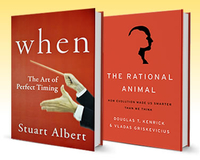Rethinking the Way We Do Business
Wednesday, October 30, 2013
Curt Carlson was a true visionary. Not only did he have the foresight to create one of the first-ever consumer loyalty programs through the Gold Bond Stamp Company, he also saw the value of investing in the intellectual capacity of the school that now bears his name.
Instead of contributing money for the construction of a building, Curt elected to fund chairs and professorships that would attract brilliant scholars to Minnesota. He gave in hopes of fostering an environment that encourages collaborative thinking and research to improve the way we do business.
He succeeded. Look at virtually any measure of academic research and you will see the Carlson School's faculty among the best in the world. For example, when you view the UT Dallas ranking of publications in the "A journals" in management (Academy of Management Journal, Academy of Management Review, Administrative Science Quarterly, Journal of International Business Studies, and Strategic Management Journal), you'll find our faculty is fourth behind only Wharton, Harvard, and INSEAD.
What excites me more than the rankings is how our influential thought leadership stands to benefit today's businesses. Two new books from our faculty are perfect examples.
Stu Albert, one of the most original thinkers around, has spent a lifetime thinking about timing issues. His insights on the importance of timing are crystallized in When: The Art of Perfect Timing, which Amazon lauded as one of the best business books of August. Aks Zaheer and I coauthored a paper with Stu called "Time Scales and Organizational Theory," which was chosen as one of the three best papers in the Academy of Management Review in 1999. It was one of the most playful, creative and fun projects I've ever worked on and reading "When" reminds me of that collaboration. It's nothing short of amazing to see how Stu has contributed to this area over the years.
Vlad Griskevicius, one of the brightest young scholars in marketing, also published a book this fall that helps us understand the psychology of how people make decisions. More importantly, it helps managers and consumers uncover why they make decisions. The book, The Rational Animal, reveals that our choices today continue to be driven by deep-seated evolutionary goals, such as attaining status, caring for family, acquiring a mate, making friends, and protecting ourselves from danger. By understanding how modern behaviors connect to their ancestral roots, managers can better predict the seemingly irrational tendencies of humans today.
I strongly encourage you to read these two books and investigate other discoveries at the Carlson School. You won't be disappointed.
